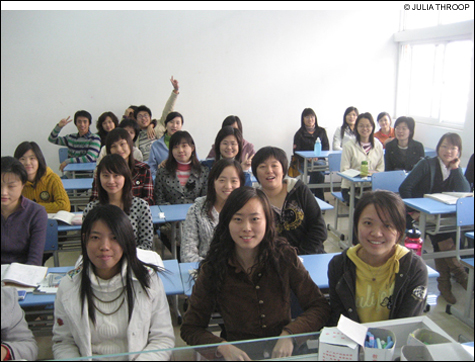
QUANTITY, NOT QUALITY: Students in China struggle to learn new mental skills with an outmoded
work ethic. |
Like most of my colleagues in China, my journey here began online. This past March, I registered with Teach Abroad Inc., a small, private agency, based in Keene, New Hampshire, that organizes a sizeable shipment of foreign teachers to China twice a year. Within a couple of months, I had an offer from the Changzhou Institute of Light Technology. What “light technology” was, exactly, I hadn't the faintest idea. (Still don’t.) But they promised 4000 yuan RMB (Renminbi, or “People’s Currency”; about $450) per month to anyone who spoke English and held a bachelor’s degree. Not a terribly demanding position, it seemed, at least on paper. I would be asked to speak my native tongue in front of 30 to 40 Chinese students for 20 hours a week. Each year, thousands of Americans — many of them recent graduates — take advantage of programs such as this to combine travel and adventure with, well . . . procrastination.
I’m the last one you’d expect to consider living abroad. I’m a picky eater with a pathetic sense of direction and terrible social skills. But, I had a desperate desire to postpone my departure from formal education and became actively interested in international work. Other things — such as a minor in Chinese, a goal of one day becoming an English teacher, and a scarcity of alternatives — were added incentives that transformed my lukewarm enthusiasm into actual commitment. I began my journey expecting the next 10 months to be a hiatus from responsibility. I didn’t realize the degree to which I was instead about to fast-forward.
Trivializing the requirements of the position was my first mistake, and my second was thinking my move abroad as nothing more than a temporary change of address. It was sometime during the 14-hour flight that I realized that a year in China would mean more than hitting life’s proverbial pause button long enough to collect foreign-teaching credentials.
Initially, there was culture shock. Upon landing in Beijing, I was inundated by unfamiliar concepts and experiences, and I thrust them under a negative light — the weary Mao-era veterans who stand at the foot of escalators, watching stair after stair pass below the floor (the escalator is a source of endless fascination for the octogenarian farmers who occasionally venture off the ranch in order to buy some brand-name products at the grocery store); the incessant drilling and plumes of chemical waste; mothers holding infants over garbage cans, and sometimes sidewalks, when nature calls. I had to remind myself that these are the things that complete the experience — like the incessant boom–sspptthhh of fireworks that make a peaceful Chinese suburb sound like a war zone and convince every new foreigner here that Changzhou is under siege. Wrestling with the unfamiliar is, I quickly learned, both the bane and purpose of living in a foreign country.
The far side of the world indeed
Changzhou is a city on the central coast of China — about an hour from Shanghai by train — where rain, canals, and fish soup abound. The city has about four million people (small by Chinese standards), one Starbucks, and a fair amount of foreigners, but not enough that we escape stares of bewilderment and curiosity from the locals. It seemed strange that Boston, population roughly 4.4 million, is only slightly larger than Changzhou, a small city ranking just above a village suburb. Then I came to realize that, amid the bustling chaos of this city, it was possible to form intimate friendships with people who were once complete strangers.